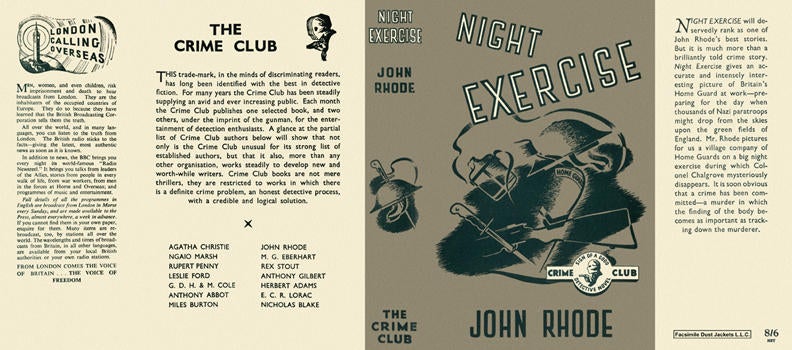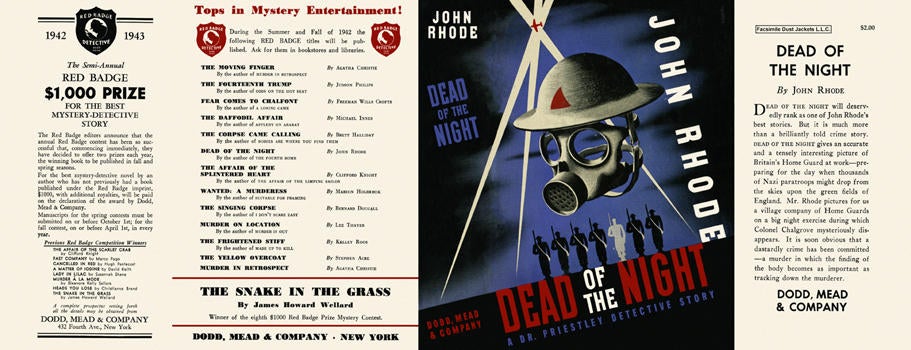(US title – ‘Dead Of The Night’)

The outbreak of the second world war had as profound an effect on authors and the publication of books in general as it did in all other areas of peoples’ everyday lives. The threat of invasion, war-time rationing and the upheaval of evacuation all had far-reaching effects on daily life, as did the shift in work patterns, with women taking over in areas that had previously been the preserve of men. Hardly surprising then that an author like John Rhode, a one-time career army officer who had been involved in military intelligence during the first world war, eventually being awarded the military cross and an OBE, would reflect these changes in his books.
Night Exercise will deservedly rank as one of John Rhode’s best stories. But it is much more than a brilliantly told crime story. Night Exercise gives an accurate and intensely interesting picture of Britain’s Home Guard at work – preparing for the day when thousands of Nazi paratroops might drop from the skies upon the green fields of England.Mr. Rhode pictures for us a village company of Home Guards on a big night exercise during which Colonel Chalgrave mysteriously disappears. It is soon obvious that a crime has been committed – a murder in which the finding of the body becomes as important as tracking down the murderer.
Blurb from 1st UK and 1st US editions
This mystery, originally published in 1942, contains all the essentials one might expect, dealing as it does with the disappearance of a universally unpopular officer during a night of military exercises to test the preparations in place to defend against possible invasion. As such it bears some similarities to Clifford Witting’s Subject: Murder (1945). Here, the Home Guard stationed in Wealdhurst, conducting numerous drills under the command of Major Ledbury, in preparation for what is considered to the inevitable invasion of England by German forces, are less than enthusiastic when their night exercises come under the scrutiny of local commander, Colonel Chalgrove. His manner, brusque and combative, certainly doesn’t endear him to the men and he finds fault with practically every detail of Ledbury’s planning. When he sets off to watch the exercises from a safe distance, he disappears – and his fate becomes the focus of the police investigation which follows. Has he been murdered? And if so, where could his body have been concealed? Is he the victim of fifth columnists? Or could one of his own men be responsible?
Rhode is naturally strong on the military detail in the story, which is as prominent as the mystery element of the narrative, which is solved by another officer who is determined to clear his name when he is suspected of involvement in the murder.

Overall this is an interesting book, though perhaps more memorable for the snapshot of the time it gives the reader than for any great detection contained therein. It does rank high for the military detail and the atmosphere created during the night maneuvers, the opening chapters in particular likely to be quite engrossing to any readers unfamiliar with the early war years. There is also some nice ambivalence created in the mind of the reader regarding Major Ledbury, with it being unclear if he is the innocent victim of circumstance, one of the main investigators on the case, or the perpetrator of a serious crime. It is also significant as the only non-series mystery Rhode published after Dr. Priestley made his debut in The Paddington Mystery (1925) – though not the only one of Rhode’s career, since three appeared before that book. Following this, Rhode never again ventured into non-series territory. However, it is the very absence of any of the usual series characters – no Dr. Priestley, Hanslet or Waghorn here to act as a familiar figure for devotees of this Golden Age great – that may encourage the Rhode collector to place this near the bottom of their list of most desired titles. A shame perhaps, as this has much to recommend it and is certainly better than some of the weaker series-titles from the latter years of his long career.
——–++++++++——–
7.5/10
Non-Series Mystery
Preceded by The Fourth Bomb (Dr. Priestley #36)
Succeded by Dead On The Track (Dr. Priestley #37)
——–++++++++——–
Edition Reviewed
First UK Edition (my collection)
——–++++++++——–
Collector’s Notes
No record of any modern reprint, ebook or audiobook has been traced by the reviewer.
——–++++++++——–
First Edition Details
UK
Originally published by Collins Crime Club, 1942
Orange Cloth Boards pp 192, 8vo
Title and Author stamped in black on spine. ‘The Crime Club’ stamped in black at bottom.
Front board plain.
Dustwrapper priced at 8/6 net net on front flap.
US
Originally published as Dead Of The Night by Dodd, Mead & Company, New York, 1942
Blue Cloth Boards, pp 278, 8vo
Title and Author reverse stamped in black square on spine. ‘Dodd, Mead & Company’ stamped in black at bottom.
Red Badge Detective logo stamped in black on front board.
Dustwrapper priced at $2 on front flap.
——–++++++++——–
R E Faust
——–++++++++——–
Please leave any comments, corrections or suggestions below.
——–++++++++——–
——–++++++++——–